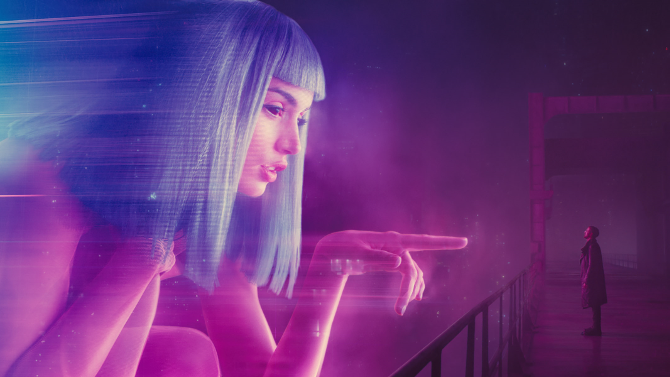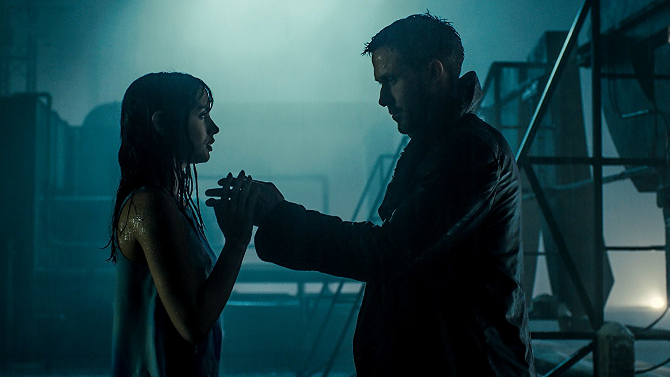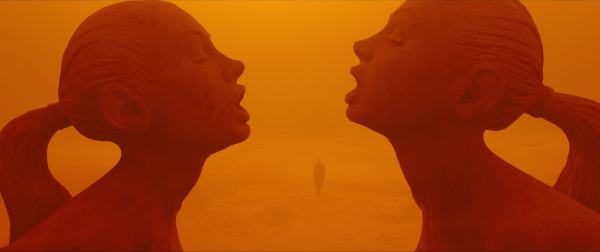Coming to theatres thirty-five years after the original motion picture, Blade Runner 2049 is set thirty years after the original film, expanding the vivid dystopic universe and the deep philosophical questions brought forth all the way back in 1982. Perhaps the most unexpected query to come out of the movie. . . can a world truly be dystopic if people are still listening to the one and only Frank Sinatra? At least to me, it cannot be too far gone if there is still the music of Ol’ Blue Eyes.
Transporting us into the world in almost the exact same fashion as the original, director Denis Villeneuve (with original director Ridley Scott now executive producing) miraculously captures the original fusion of futuristic sci fi and film noir, with touches of his own unique style – all done in a more expansive, epic way.
Before getting into the synopsis, some may ask whether they can see this sequel without watching the original. Arguably, it can (and does) stand alone, but there are some connections to the back story that will only bring thrills to those who have seen the 1982 feature. When we spot Edward James Olmos (reprising his role of Gaff), a now elderly man still making his origami, it highlights the passage of time to fans, yet will mean little to those who have not experienced the original. Similarly, the way in which they build the back story of the characters of Rick Deckard (Harrison Ford) and Rachel (a youthful Sean Young making an appearance through the magic of CGI), forges a meaningful experience for these personas who, when we last saw them, were running for their lives. Likewise, spotting advertisements for companies like Atari will bring a smile to those who remember the ways in which those businesses were promoted in the first film.
Seeing a world that has both evolved and devolved over thirty years, the Tyrell Corporation, which originally developed the Replicants, went out of business following their violent issues with the bio-engineered beings. Purchased by Niander Wallace (Jared Leto), his company has found a way to curb the rebellious violence once found in the very human-like Replicants, and is finally able to integrate them into the general population.
Despite this, there are still a fair number of the former models that live on, continuously hunted by Blade Runners. Our lead is K (Ryan Gosling), a prime example of one of these new Replicants – killing his own kind in the name of the law. Tracking down one of the aforementioned earlier models, Sapper Morton (Dave Bautista), it is this event that is the genesis of the mysterious case that K will investigate.
A complex caper, it appears that a Replicant may have had a child – something thought impossible. . . and, if revealed, could bring the fragile wall down that separates the divide between human and Replicant (there is much hatred directed towards the almost-humans). Lt. Joshi (Robin Wright) understands the need for this record to be erased, and sends K to clean his tracks and follow the trail before someone else discovers the secret.
A two-pronged tale, as K investigates, Wallace sends his number two, Luv (Sylvia Hoeks), to track the Blade Runner, as he does not have the ability to build Replicants fast enough – by nabbing those involved in the birth, he hopes to learn the secret of life within a female Replicant.
Eventually, through many trials and tribulations, K tracks down Deckard, hiding in the dust strewn, atomically destroyed city of Las Vegas, where he hopes to find the answers to all of his questions.
An unusual example of a 185 million dollar blockbuster, the two hour and forty-three minute film, based upon an underperforming though loved movie, is a complicated rumination on life, love, racism and humanity/the soul. A slow burner, it is not the fast paced, action packed feature many expect from a big box office spectacle, instead staying true to the original complex piece, channelling the dark, depressing world that holds only a sliver of hope, and, not the type of movie that spoon-feeds you. Memory, like in the 1982 picture, also plays an integral part. K, like other Replicants, has an implanted history, doubting what he knows and who he really is. One particular memory plays a vital part, a moment from his supposed fake past that finds him hiding a carved wooden horse from bullies in a boiler room. . . though, when he stumbles upon the locale and discovers the token, he begins to question his past, present and future. This draws him to memory designer Dr. Ana Stelline (Carla Juri), as he looks for answers to many a question.
K’s love life is also intriguing. Purchasing a realistic holographic girlfriend named Joi (Ana de Armas), she can transform from a prototypical 1950’s housewife, serving her man a home cooked meal (that holographically covers the real junk they eat in 2049), to anything he desires. . . even able to sync up to a real woman to make it seem like he is making love to her. There is a palpable love there, which makes it all the more depressing when one considers that it is wholly fake, despite her very real demeanor. Always claiming that there is something special about him, it is Joi who names K – Joe, giving him a more human reality (this soft touch comes back in a hard hitting way towards the end of the picture).
Still at the story’s heart, this is a debate about the humanity of humans and Replicants. As the film progresses, and K goes deeper and deeper down the rabbit hole, he evolves and changes, transforming by way of the new reality he has discovered. Hunting those who have been delegated to the job of slaves (and then killed by Blade Runners), K sees that they seemingly have more hope and humanity than the humans he is surrounded by, a cause they are willing to die for (which one of them explains is a very human thing).
At nearly three hours, each second of its run time is packed with visual splendour. Villeneuve, his cinematographer Roger Deakins, and the rest of his team develop a more expansive film than its predecessor, and we now truly understand the scope of this world. With nature nearly extinct, it is a place where having a small carved wooden figurine brings with it a price tag of a small fortune – due to the scarcity of wood. With more of that blueish hue found in the original, and even larger three dimensional corporate advertisements, Los Angeles is grander, but no more alive – rain and snow often fall in the city. Technology is used to take the edge off of the bleak, sombre society, though it is like trying to sugarcoat coal. But, interestingly, unlike the original, there are moments of bright colour, both memories and Las Vegas symbolic of something different, a variation on the theme of depressing life, at least to these oppressed Replicants.
Thankfully, 2049 is able to sync up with Blade Runner, furthering the themes of the original, yet never feeling like a cheap copy or reboot. Just as complicated, transcendent and powerful, the pair combine to make an impressive franchise, unlike many sequels that, despite being made much sooner, come off as being a bigger, more bloated piece of repetitive fare.
With stellar performances, mind-boggling visuals, a reminiscent score (by Benjamin Wallfisch and Hans Zimmer), a brilliant story and heady subject matter, Blade Runner 2049 is a work of art. A tale of self-discovery, as well as so much more, K must drudge though his drab, dark, violent existence until he finds his place in this world (somewhat like Plato’s ‘Allegory of the Cave’), and despite finding himself literally dwarfed by gargantuan statues in Las Vegas, he soon realizes that he has a part to play. In many ways rooted in ancient philosophy, it must be understood that we cannot truly appreciate life and love without experiencing loss and pain – it is this duality that speaks to being a human. . . will K truly discover this? So, for those of you who have been dying to see a quality sequel that is thirty-five years in the making, check out Blade Runner 2049. . . and make sure to bring along your memories from the original – let’s just hope they’re your own.




Good review, sounds interesting, I didn’t see the first Blade, would it be worth seeing this film? I do love Ryan Gosling
As I said in the review, it can stand alone, though I would always recommend seeing the original first.